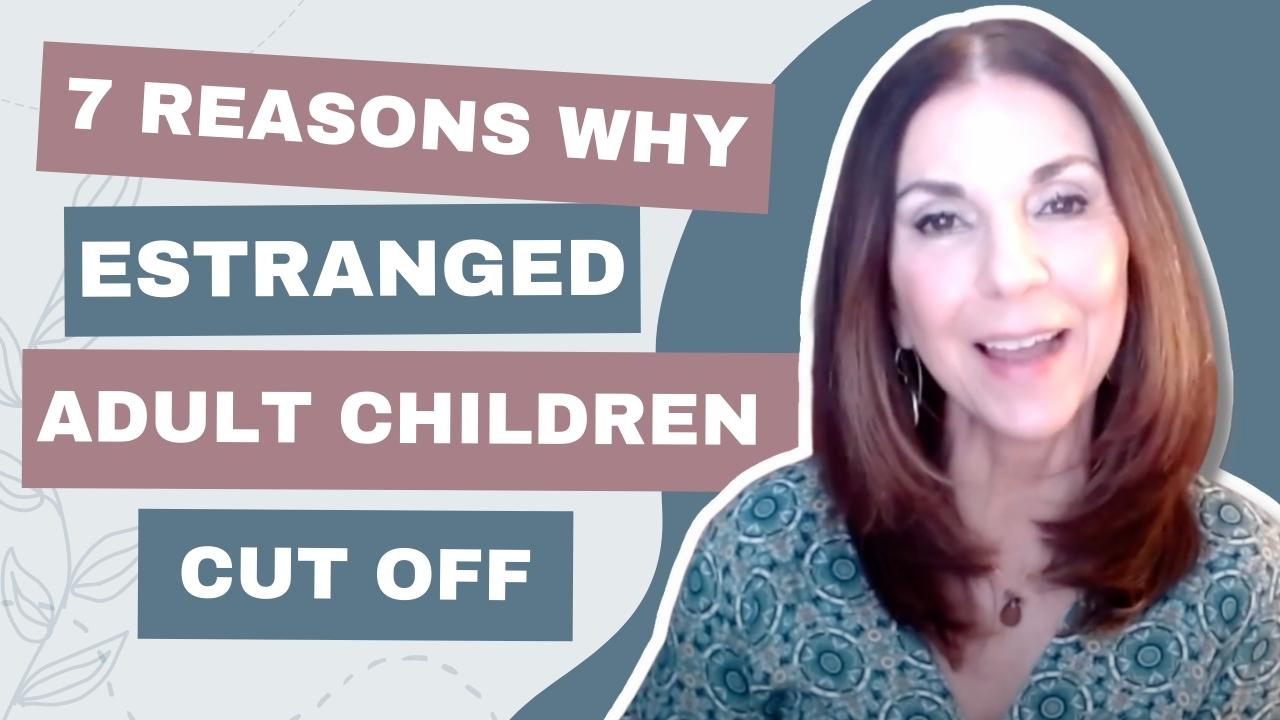This article is Part 2 of Estranged Adult Children Understanding Why they Cut Off. Wondering what other factors play a role in an adult child’s decision to cut ties with a parent? In the following article, you will learn seven contributing factors.
Adult children are moving towards cutting ties themselves with their parents and being done with trying to make the relationship work. Some are done with demanding obligations to fulfill a parent’s expectations. Other adult children estrange when they are fed up with intolerable behaviors. They may reach the last straw and detach because of tensions with their spouses and parents. Alternatively, they may be exhausted apologizing for their lifestyle, values, and choices.
Estrangement describes the condition within families that experience physical and or emotional distance from one or more family members. Estrangement is a complex mix of factors that deteriorate a relationship over time and even generations. Common factors that contribute to parent and adult child estrangement include divorce, being too close to one or more parents, differing values, lifestyles, and choices, difficult son or daughter in law, mental illness and addiction, and their therapist. Research indicates that estrangement and the breakdown of the parent-child relationship are multilayered.
For example, adult children cut ties with their parents because of societal changes, money, unmet expectations, perceptions of lousy parenting, unmanageable strain over secret-keeping, a history of ineffective communication, and severe life stressors.
An adult child’s perspective and decision to cut off is likely an attempt to manage their discomfort. Primary distress includes reducing conflict, tension, anxiety, differing values, and a general belief that being apart is more desirable than having contact. Parental experiences can be confusion, disappointment, grief, anxiety, and sadness.
Cut-off parents can be dumbfounded and bewildered when the break is sudden and unexpected.
Some may have noticed a lessening of contact but never expected a severed relationship. The intense emotional stress of estrangement can cause chronic stress due to the loss of a reliable connection and the ambiguous and uncertain nature the cut-off brings. Stressful life events such as estrangement can impact one’s emotional and physical health. All parties, parents, and adult children are affected by the stigma, rejection, and uncertainty of reuniting.
Individual responses to the stress of estrangement vary; however, no one is immune to its effects. Many consider therapy to aid in coping with sadness, overwhelm, and depression.
Strategies to reduce stress include meditation, prayer, intentions, exercise, mindfulness, sleeping well, and consistent daily routines. Being informed provides insight and empowerment on moving forward despite the uncertain outcome. What is behind the increased trend of adult children to cut ties with their parents?
1. Societal Change
Indeed, positive societal changes such as more equality, opportunity, freedoms, and the
acceptance of differences have brought significant advantages to our society. These transformations included a departure from previously held social norms.
Kylie Agllias, researcher and educator, notes that the promotion of individualism beginning in the 1960s has created a rise indispensable relationships. Divorce is part of the estrangement scheme and has more autonomy, independence, and self-interest. Family estrangement is not new; however, the societal shift towards individualistic thinking participates in the condition.
Dr. Joshua Coleman discusses the rise of individualistic thinking in his book “Rules of Estrangement,” which states obligations as opposed to one’s individual preferences can place demands on the relationship. The shift in values from loyalty, reciprocity, and responsibility has given way to independence, autonomy, and self-interest.
2. Unmet Expectations
Expectations are a natural part of relationships. Parents have standards about how much time and support they would like to receive from their family and adult children. The commonality and exchange within families are part of social norms and expectations. Standards and expectations of reciprocity such as “If you need me, I am there for you, and when I need you, you will be there for me” are not uncommon. When an adult child breaks the standard, it can feel like a violation and cause friction and resentment.
Also, many parents today have invested heavily in their adult kids and often carry an expectation of reciprocity. Adult children may feel pressured to oblige in families that struggle with communicating and have unmet expectations. This entanglement of obligations and expectations can further push the adult child away from their parents. They may be unable to cope with the burden of choosing who to please, their parent or themselves. Likewise, they may also be ill-prepared to communicate their discomfort and find detaching a less stressful solution.
3. Parenting is to Blame
Estrangement stories and parenting styles vary greatly. Unfortunately, abusive, selfish, negligent, absent, uninvolved, and unloving parents exist. When the children of these parents go to therapy, they are encouraged to separate with good reason.
However, recently, the bar has changed such that abuse now includes inconsistent parenting, fighting, yelling, and nasty behaviors towards children. Researchers have noted that the changing measure of inadequate parenting further complicates adult children’s perceptions. Qualifying trauma no longer involved the same qualities in the Diagnostic and Statistical Manual in 1952. As a result, the evaluation depends on the adult child’s perceptions.
Imperfect parenting hurts kids. However, many parents would never hurt their children intentionally. Research suggests that it appears that the focus of blaming parents anywhere on the parenting spectrum is fashionable.
4. Money
Many estrangement stories are rooted in the who, what, where, when, and how of your money and or property. Dr. Karl Pillemer notes that sibling rivalries, expectations of unending support, unpaid loans, and their perception of unfair inheritances can aggravate the conflict. Often, deep-rooted conflict can result in estrangement when no resolution occurs.
5. A History of Ineffective Communication Patterns
Communication within a family in the context can exist on a spectrum. Consider that on one end of the range are families that rarely discuss complex issues. On the other end are families that are highly verbal and brutally honest. Families can be discouraged from voicing opinions or suffer the consequences of one parent’s displeasure. Dysfunctional families include a lack of empathy, perfectionism, highly critical, lack of privacy, control, and practical communication skills. Families will argue and hold grudges and be disrespectful.
Finally, an enormous insult to the fabric of a family is the inability to apologize and work towards resolving family conflict.
6. Family Secrets
Secret keeping is stressful for all members of a family. Naturally, no one wants to talk about deep financial burdens, a parent’s alcoholism, or a long-standing extended family rift. Having family secrets places a duty on adult children and the family unit.
Kept secrets can strengthen the bond of a family for a time. However, when there are secrets among family members, the one not privy to the mystery can sense something is out of order. Secrets can create a distorted view of reality. Withholding information and the requirement of keeping secrets places undue stress upon family members.
7. Intense Life Stressors
The untimely death of a loved one, significant illnesses, the onset of a disability, poor mental health, substance use, incarceration, job loss, divorce is extreme life events that may have severe psychological impacts. Such stressors can affect communication patterns and perceptions of belonging, and sense of security. These events may pose a physical, emotional, and financial burden on a family unprepared to cope with the unexpected demands. Some individuals may decide to detach to cope with the burdensome situation to alleviate the ensuing distress.
Adult children are often removing themselves from their parents being done with trying to make the relationship work. Some are done with demanding and intolerable behaviors. They may reach the last straw due to a variety of reasons. Societal changes, money, intense life stressors, family secrets, the perception of bad parenting, and a history of ineffective communication skills may also affect parents’ estrangement with their adult children.
Cutting ties with family hurts all parties. The misperception that just one difficult person and poor communication are responsible for family estrangement creates stigma.
This article shared with you seven contributing factors why estranged adult children cut off.
Get The eBook: Feeling Heartbroken and Alone? How to Pick Up the Pieces When You are Estranged.
Resources:
- Agllias, Kylie. Family Estrangement A Matter Of Perspective. New York, Routledge, 2017.
- Coleman, Joshua. Rules of Estrangement. New York, Harmony Books, 2020.
- Morin, Marie. Feeling Heartbroken and Alone? How to Pick Up the Pieces When You are Estranged. eBook. 2022.
- Morin, M.L. [Morin Holistic Therapy]. (2022, January 4 ). What is Family Estrangement? You Are Not Alone.
- Morin, M.L. [Morin Holistic Therapy]. (2021, September 8). Diaphragmatic Breathing: 5 Minute Deep Breathing Exercise for Beginners.
- Morin, Marie. How to Deal with Estranged Family During the Holidays (2021, November 21) Sixty and Me. https://sixtyandme.com/estranged-family-holidays/
- Pillemer, Karl. Fault Lines Fractured Families and How to Mend Them. New York Penguin Random House, 2020.









